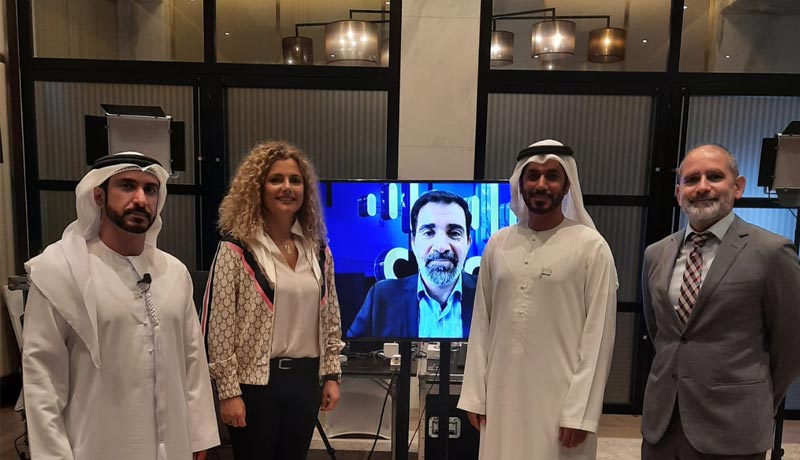
Project Management Institute (PMI), MENA has brought together experienced business leaders and change-makers for a roundtable discussion that underlined the importance of greater investment in technology to safeguard the regions’ future.
Grace Najjar, Managing Director of PMI MENA, said: “Today, more so than ever, technology is decidedly important to attaining sustainable success in all aspects of business, life and community-building. As we cast our eyes to the future, it is crucial that we harness the potential and power of technology and tech-driven projects to not only accelerate our post-COVID recovery, but to spur the lasting changes and pioneer the innovations that will help us overcome present and future challenges — especially in a rapidly evolving business environment.”

She added: “As evinced by so many prominent examples across the region and the world, technology will be the foundation on which success is built in the Project Economy. Now — as business leaders, changemakers, project professionals, communities and nations — we must work together to build upon the progress we have already made to ensure our potential and ambitions are fully realised.”
Dr. Mohammad Al Redha, Director, Project Management Office, Health Informatics & Smart Health – Dubai Health Authority, said: “The healthcare sector has enjoyed major transformations over the past 20 to 30 years. Digital acceleration has played an integral role in spurring these changes across the region, with emirates such as Dubai proving— from the onset of the pandemic and in its wake — that the future of the Middle East and North Africa is safeguarded by world-class infrastructure, forward-thinking leaders and innovative decisionmakers.”
Leaders in the meeting titled, Digital Transformation Shaping the Business World, on Thursday 4th November highlighted the role of technology in driving long-lasting and sustainable breakthroughs. Central to the discussion was the key role information technology plays in enabling leaders to execute their national visions, specifically pointing out that new technologies and innovations are fully geared towards helping governments, businesses and organizations deliver even more value and quality. The advent of cloud computing, for instance — the panel of speakers underlined — has empowered teams to work with greater security and convenience, doing so by reducing the lengthy processes of procuring physical assets.
Eng. Eisa Khalid Al Ali, Vice President PMO – North25, said: “. Be it in construction or project management, technology should be utilised in unison with human capabilities — such as emotional intelligence and diplomacy — tohelp us realise the fullness of our potential. Technology should, therefore, serve us — as opposed to the other way round. Moreover, integrating agility and gradually introducing technology to our ways of working, especially during the planning phases, have been crucial in helping digitise our project and portfolio management and transform our businesses. People skills and processes must be more advanced than technology to successfully handle portfolio of up to 30 billion US dollars and achieve far more than we ever thought possible.”
Osama Al-Zoubi, Chief Technology Officer, Cisco Middle East and Africa, said: “Our vision is to empower an inclusive future for all. We aim to do so by connecting the unconnected. We believe this will create an incremental economic impact with more than 6.7 trillion US dollars being added to the global economy and over 500 million people being brought out of poverty. Advanced technology and Artificial Intelligence will allow project managers and professionals to accomplish these goals and deliver better and scalable outcomes in all sectors.”
Peter Chalouhy, Advisory & Implementation Services Business Leader at Kyndryl, said: “The last year underlines how much project management contributes to technological advancements and digital transformation. Today, more so than ever, CIOs and directors need advisors and project managers to help equip them with the tools to maximize their budgets, reach their targets and achieve their goals. Technology, paired with skilled project managers, provide real value; enabling leaders to plan Today and prepare for the changes of tomorrow.”
The roundtable featured a line-up of panelists that included Dr. Mohammad Al Redha, Director, Project Management Office, Health Informatics & Smart Health – Dubai Health Authority; Eng. Eisa Khalid Al Ali, Vice President PMO – North25; Osama Al-Zoubi, Chief Technology Officer, Cisco Middle East and Africa; and Peter Chalouhy,Advisory & Implementation Services Business Leader at Kyndryl.
Healthcare and construction were mentioned as two examples of real-world businesses that have benefited substantially from digital acceleration. Future hospitals will deliver more efficient care and better, more streamlined patient journeys. Improvements in construction result in less risk and human error, as well as more advanced health and safety precautions, thanks to the creation of new solutions and techniques.
The event also highlighted the role of technology in unleashing talent and potential, with the deployment of Artificial Intelligence (AI) within teams allowing leaders, employers, and project managers to allocate repetitive jobs to AI-powered resources.This allows leaders to assign more complicated jobs requiring specific skill sets, such as those requiring power skills like empathy, to people rather than machines or automated systems. The panel urged changemakers and leaders worldwide to embrace digital transformation, describing technology as critical to advancement in all areas of life, including business, community development, and education.
In addition to promoting innovation, the event’s panelists emphasized the importance of addressing the challenges that transformation brings, such as cyber security, the importance of being people-first and humancentric in both business and community life, and delivering results in a fast-changing business environment.
The panelists emphasized that the key to overcoming these issues is to continue to build fundamental people and power skills, such as collaborative leadership and empathy, and to train future leaders and employees to apply these capabilities within the modern business ecosystem.
